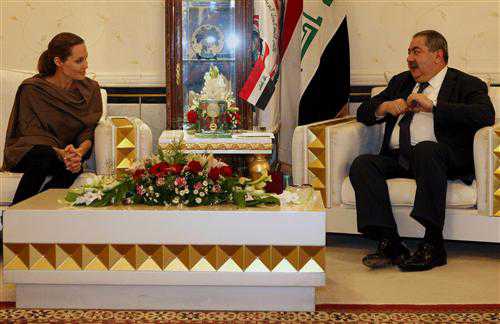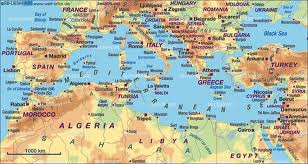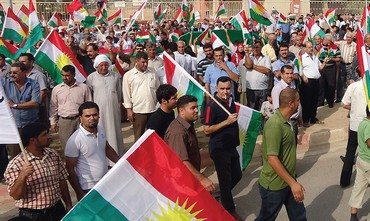If there is one country that has helped build a Kurdish entity in Iraqi Kurdistan it is Turkey. This assertion seems paradoxical in view of Ankara’s traditional opposition to such an eventuality in Iraq and the well known pressures it applied on its allies, especially the United States, not to lend any support to the Kurds of Iraq because of the possible spillover effects on its own
restive Kurds. Turkey’s new stance appears even more paradoxical against the backdrop of the latest upheavals in the
region and their contagious effects both on its own Kurds and those of Syria.
How is one to explain these paradoxes? First let us have a quick look at the facts on the ground. Since the 1991 Gulf War and much more so after the 2003 Gulf War Turkey has turned itself, slowly but surely, and against its better judgment, into the lifeline for Iraqi Kurdistan, which is led by the Kurdistan Regional Government (KRG), the euphemism for a Kurdish state in the making.
The slow change in Ankara’s policy towards the KRG was not due to any altruistic considerations but for very pragmatic, down to earth ones. Immediately after the 1991 Gulf War and the crushing of the Kurdish uprising which ensued, Turkey was confronted with the problem of a million Kurdish refugees on its border. Unwilling to burden itself with another million Kurds, Turkey devised with the Allies the “Provide Comfort” project for the fleeing Kurds to enable them to go back to their homes.
This plan, together with “the no-fly zone” where the Iraqi army could not act against the Kurds, as well as the ruptured relations between Ankara and Baghdad due to the war, set in motion the schizophrenic relations that would develop between Turkey and the KRG.
On the one hand Turkey was extremely apprehensive of the possible contagious effects of the KRG on its own Kurds, hence Ankara’s attempts to thwart any political and diplomatic gains by the KRG. On the other hand Ankara did its best to reap the fruits of its relations with the emerging entity, one of the most important of which were economic gains. This approach turned the Kurdistan Region into a huge investment area for Turkish companies whose number reached around 900 by 2012 and amounted to half of the companies acting in the KRG.
To this list one should add other large business, cultural and social ventures which turned the KRG into an undeclared Turkish sphere of influence. The net result was that no less than seven percent of Turkish exports went to the KRG.
Ankara’s thirst for oil and gas and the pressure brought to bear on it to stop importing from Iran go a long way to explain the surprising pipeline deal it cut with the KRG on May 20, 2012, without the approval of the central government in Baghdad. If it materializes, the deal, which envisaged the building of two oil pipelines and one gas pipeline from the Kurdistan Region to Turkey, might give further boost to Kurdish aspirations for independence.
Interestingly, the Turkish Minister of Energy and Natural Resources, Taner Yildiz, declared on that occasion that “Turkey should also be considered as the Regional Kurdish Government’s gateway to the West.”
A second important aim for developing these relations was the hope that the KRG would help in solving Turkey’s own acute Kurdish domestic problem, namely the ongoing attacks which the armed Turkish Kurdish PKK continued to launch against Turkish state targets.
However, Ankara’s hope that the KRG would fight against, or at least contain the PKK, whose bases are found in Iraqi Kurdistan, was not fulfilled. The third and perhaps most important consideration was Ankara’s need to attune itself to the region’s changing geostrategic map, which pushed it to act according to the dictum “my enemy’s enemy is my friend.”
The geostrategic considerations gathered momentum in the past two years due to several developments, all of which impacted negatively on Turkey’s environment and its foreign policy configurations.
Before analyzing these changes it must be stressed that the stance of the AKP government toward the Kurdish domestic issue as well as towards the KRG underwent slow transformation, which distinguished the AKP from earlier Kemalist governments.
The geostrategic changes were quite drastic, including the “Arab Spring,” which accelerated the collapse of the Turkish-Iranian-Syrian axis. Furthermore, the revolution in Syria not only turned Ankara and Damascus into sworn enemies once again but also raised the specter of the influx of Syrian refugees. Worse still, it opened the Pandora’s box of Syrian Kurds and their possible collaboration with their brethren in Turkey, not to speak of the PKK card which Damascus started to employ once again against Ankara.
The withdrawal of the American forces from Iraq in November 2011 and the vacuum left thereby was another very worrying development for Turkey, as it enhanced its competition with Iran for filling this vacuum.
Lastly, one should note the deteriorating relations between Ankara and Baghdad against the background of the Sunni-Shi’ite rivalry in the region, Iraqi Prime Minister Nuri al-Maliki’s growing tilt toward Iran and his support for Syrian president Bashar al-Assad, as well as the growing personal antipathy between Turkish Prime Minister Tayyip Erdogan and Maliki.
All this weakened Ankara’s “commitment” to the almost sacred notion of Iraqi unity and emboldened it in its bilateral ties with the KRG, the most challenging of which for Baghdad was the oil pipeline deal mentioned above.
Turkey’s changing policy towards the KRG and its president Masu’d Barzani found its expression on the symbolic level as well.
Barzani’s April visit to Turkey was a case in point. While in the past Ankara treated Barzani as a mere “head of tribe,” in this most recent visit it accorded him a welcome befitting a head of state, thus turning him into one of its important allies in the region. Moreover, in this visit Barzani reiterated publicly the Kurds’ right to self-determination but, interestingly enough, Turkish officials and the media chose to turn “a deaf ear” to this declaration.
Turkey is facing now a Kurdish problem on all three fronts, which has multiplied its dilemmas but which has moved it, so it seems, to adopt a flexible and non-conventional policy: Embracing the KRG so as to contain its own Kurds and Syria’s as well. Should Turkey decide to give Barzani the green light, he would not hesitate to go the extra mile and declare independence. One thing is certain: Turkey has willy-nilly helped the Kurdish genie escape from the bottle and it will be very difficult for Ankara to push it back inside.
Prof. Ofra Bengio is head of the Kurdish Studies Program at the Moshe Dayan Center, Tel Aviv University and author of The Kurds of Iraq: Building a State within a State.






